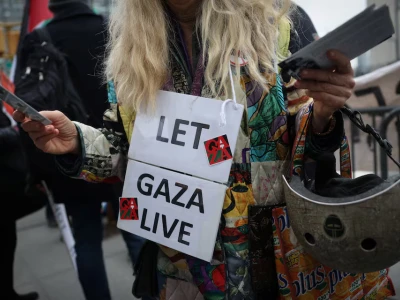
Israel promises swift response to synagogue shooting
Police said Alkam arrived at 8:15 p.m. and opened fire with a handgun, hitting a number of people before he was killed by police.
JERUSALEM, Jan 28 (Reuters) - Israel's Prime Minister Benjamin Netanyahu pledged on Saturday a "strong, swift and precise" response to a deadly Palestinian shooting attack near a synagogue on Jerusalem's outskirts, as its military sent more troops into the occupied West Bank.
Seven people were killed in Friday's attack and two others were wounded in another shooting in the city on Saturday.
"We are not seeking escalation, but we are prepared for any scenario," Netanyahu said as he convened his security cabinet which he said would seek an increase in gun permits for licensed civilians to defend against street attacks.
On Saturday, a 13-year-old Palestinian boy opened fire at a group of Israeli passers-by wounding two, before he was shot and wounded by one of them, police said, in Silwan, a Palestinian neighbourhood that lies below Jerusalem's Old City walls.
The attacks took place towards the end of a month of growing confrontation and follow an Israeli raid in the West Bank city of Jenin that killed nine Palestinians, including seven gunmen, and cross-border fire between Israel and Gaza.
An Israeli military spokesperson said an additional battalion had been sent to the West Bank for reinforcement.
There was no sign, however, Israel was preparing for a large-scale operation and its brief cross-border exchange with Gaza ended with no casualties.
On Monday U.S. Secretary of State Anthony Blinken is due to arrive for a two-day visit to Israel and the West Bank, where clashes have worsened for months.
Thursday's raid was the deadliest in years in the West Bank, where Israel has stepped up operations since a spate of deadly Palestinian street attacks in its cities last year.
At least 30 Palestinians - militants and civilians - have been killed in the West Bank since the start of the month.
Palestinian President Mahmoud Abbas made no mention of the Jerusalem shootings in a statement published by the official Palestinian agency WAFA, and blamed Israel for the escalation in violence.
Abbas's Palestinian Authority, which has limited governing powers in the West Bank, suspended security cooperation arrangements with Israel after Thursday's Jenin raid.
SCENE AT SYNAGOGUE
Friday's attack outside a synagogue was the deadliest in the Jerusalem area since 2008. It took place in a neighbourhood on land that Israel annexed to Jerusalem after capturing it in the 1967 Middle East war, in a move not recognised internationally.
The gunman, Khaire Alkam, was a 21-year-old Palestinian from East Jerusalem. Among the dead was a 14-year-old boy, police said. No group has claimed responsibility for the shooting and Alkam's father told Reuters his son had no links to militants.
Forty-two suspects, including his family members, had been arrested, police said. Netanyahu said he would also propose at the cabinet meeting sanctions against families of attackers.
Police said Alkam arrived at 8:15 p.m. and opened fire with a handgun, hitting a number of people before he was killed by police.
Shimon Israel, 56, who lives nearby, said his family were starting their Sabbath dinner when they heard shooting and screaming. He opened the window and saw his neighbour running on the street to get the police.
"I told him 'Eli, don't go there. Eli don't go.' He got married only a year ago. A good neighbour, like a brother. He ran. I saw him fall there," Israel told Reuters.
"Natali, his wife, ran after him. She saw someone here and was trying to resuscitate him. The terrorist came and shot her from behind and got her too," he said.
In Tel Aviv, tens of thousands of Israelis demonstrating against Netanyahu's plans to overhaul Israel's judiciary, began the protest with a minutes of silence for the dead.
The gunman was a relative of a 17-year-old Palestinian who was shot dead on Wednesday in clashes with Israeli forces in a Jerusalem refugee camp, his family said.
His father, Moussa Alkam, said he did not know whether his son was seeking revenge. "He is neither the first nor the last young man to get martyred and what he did is a source of pride," Alkam said.
CONDEMNATION
At a Jerusalem hospital treating casualties, Israel's far-right National Security Minister Itamar Ben-Gvir said he would push for more gun permits.
"I want weapons on the street. I want Israeli citizens to be able to protect themselves," he said.
Finance Minister Bezalel Smotrich, who heads the pro-settler Religious Zionism party, said he would demand speeding up Israeli settlement construction plans in the West Bank, which his party hopes to eventually see annexed, though there was no indication Netanyahu would meet his demands.
Both Ben-Gvir and Smotrich are members of Netanyahu's security cabinet.
Friday's shooting, on International Holocaust Remembrance Day, was condemned by the White House and U.N. Secretary General Antonio Guterres, who urged "utmost restraint".
A Ukrainian woman was among the dead, Ukraine's President Volodymyr Zelenskiy said in Kyiv.
Jordan and Egypt, Arab countries that have signed peace treaties with Israel, condemned the shooting as did the United Arab Emirates, one of several Arab states that normalised relations with Israel just over two years ago.
Saudi Arabia, which does not have formal ties with Israel, condemned the targeting of civilians and said there was a need to halt an escalation in violence.
Lebanon's Iran-backed group Hezbollah praised the attack, as did Hamas and the smaller Islamic Jihad. Hamas leader Ismail Haniyeh said on Saturday that the region was heading toward escalation.




